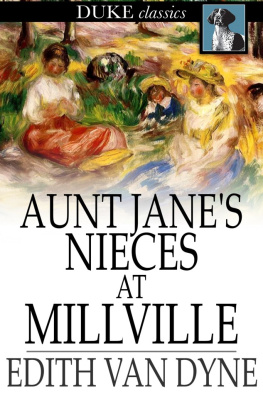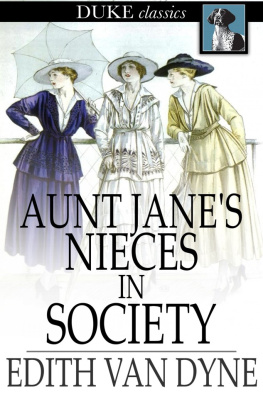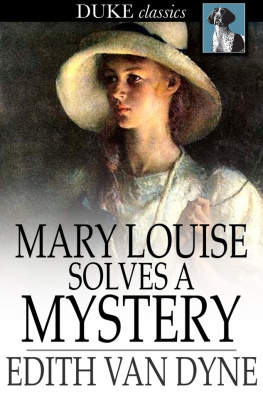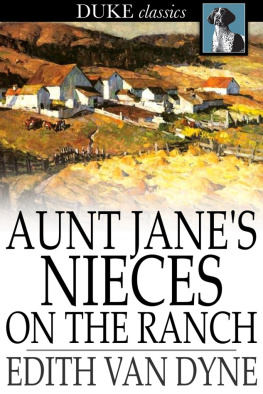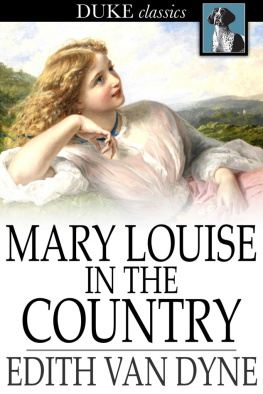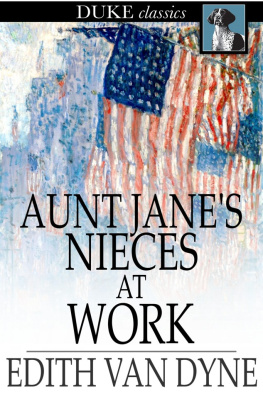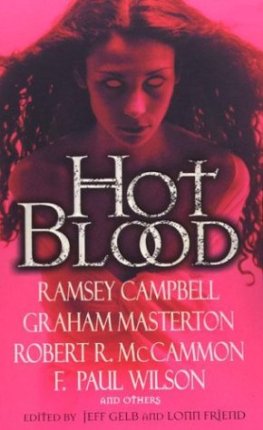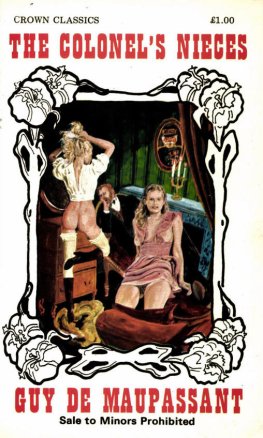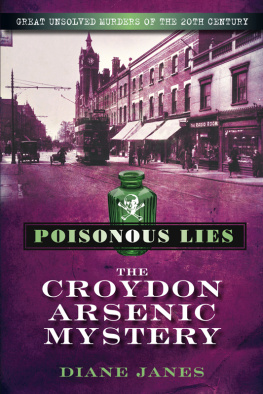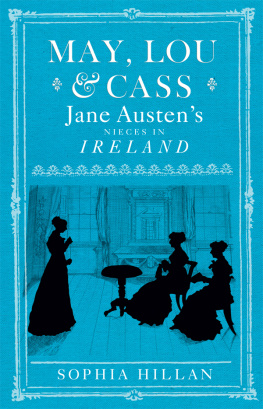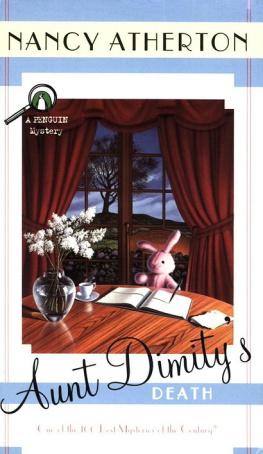AUNT JANE'S NIECES AT MILLVILLE
* * *
EDITH VAN DYNE
*
Aunt Jane's Nieces at Millville
First published in 1908
ISBN 978-1-62013-582-2
Duke Classics
2014 Duke Classics and its licensors. All rights reserved.
While every effort has been used to ensure the accuracy and reliability of the information contained in this edition, Duke Classics does not assume liability or responsibility for any errors or omissions in this book. Duke Classics does not accept responsibility for loss suffered as a result of reliance upon the accuracy or currency of information contained in this book.
Contents
*
Chapter I - Uncle John's Farm
*
"How did I happen to own a farm?" asked Uncle John, interrupting hissoup long enough to fix an inquiring glance upon Major Doyle, whosat opposite.
"By virtue of circumstance, my dear sir," replied the Major, composedly."It's a part of my duty, in attending to those affairs you won't lookafther yourself, to lend certain sums of your money to needy andambitious young men who want a start in life."
"Oh, Uncle! Do you do that?" exclaimed Miss Patricia Doyle, who satbetween her uncle and father and kept an active eye upon both.
"So the Major says," answered Uncle John, dryly.
"And it's true," asserted the other. "He's assisted three or four scoreyoung men to start in business in the last year, to my certainknowledge, by lending them sums ranging from one to three thousanddollars. And it's the most wasteful and extravagant charity I everheard of."
"But I'm so glad!" cried Patsy, clapping her hands with a delightedgesture. "It's a splendid way to do goodto help young men to get astart in life. Without capital, you know, many a young fellow wouldnever get his foot on the first round of the ladder."
"And many will never get it there in any event," declared the Major,with a shake of his grizzled head. "More than half the rascals that Johnhelps go to the dogs entirely, and hang us up for all they've borrowed."
"I told you to help deserving young men," remarked Uncle John, with ascowl at his brother-in-law.
"And how can I tell whether they're desarving or not?" retorted MajorDoyle, fiercely. "Do ye want me to become a sleuth, or engage detectivesto track the objects of your erroneous philanthropy? I just have to forma judgment an' take me chances; and whin a poor devil goes wrong Icharge your account with the loss."
"But some of them must succeed," ventured Patsy, in a conciliatory tone.
"Some do," said John Merrick; "and that repays me for all my trouble."
"All your throuble, sir?" queried the Major; "you mane all mythroublewell, and your money. And a heap of throuble that confoundedfarm has cost me, with one thing and another."
"What of it?" retorted the little round faced millionaire, leaning backin his chair and staring fixedly at the other. "That's what I employyou for."
"Now, now, gentlemen!" cried Patsy, earnestly. "I'll have no businessconversation at the table. You know my rules well enough."
"This isn't business," asserted the Major.
"Of course not," agreed Uncle John, mildly. "No one has any businessowning a farm. How did it happen. Major?"
The old soldier had already forgotten his grievance. He quarreledpersistently with his wealthy employer and brother-in-lawwhom hefairly adoredto prevent the possibility (as he often confided toPatsy) of his falling down and worshiping him. John Merrick was amulti-millionaire, to be sure; but there were palliating circumstancesthat almost excused him. He had been so busily occupied in industry thathe never noticed how his wealth was piling up until he discovered it byaccident. Then he promptly retired, "to give the other fellows achance," and he now devoted his life to simple acts of charity and thewelfare and entertainment of his three nieces. He had rescued MajorDoyle and his daughter from a lowly condition and placed the former inthe great banking house of Isham, Marvin & Company, where John Merrick'svast interests were protected and his income wisely managed. He hadgiven Patsy this cosy little apartment house at 3708 Willing Square andmade his home with her, from which circumstance she had come to berecognized as his favorite niece.
John Merrick was sixty years old. He was short, stout and chubby-faced,with snow-white hair, mild blue eyes and an invariably cheery smile.Simple in his tastes, modest and retiring, lacking the education andrefinements of polite society, but shrewd and experienced in the affairsof the world, the little man found his greatest enjoyment in the familycircle that he had been instrumental in founding. Being no longerabsorbed in business, he had come to detest its every detail, and soallowed his bankers to care for his fortune and his brother-in-law todisburse his income, while he himself strove to enjoy life in a shy andboyish fashion that was as unusual in a man of his wealth as it wasadmirable. He had never married.
Patricia was the apple of Uncle John's eye, and the one goddessenshrined in her doting father's heart. Glancing at her, as she sat hereat table in her plain muslin gown, a stranger would be tempted to wonderwhy. She was red-haired, freckled as a robin's egg, pug-nosed andwide-mouthed. But her blue eyes were beautiful, and they sparkled with acombination of saucy mischief and kindly consideration for others thatlent her face an indescribable charm.
Everyone loved Patsy Doyle, and people would gaze longer at hersmiling-lips and dancing eyes than upon many a more handsome but lessattractive face. She was nearly seventeen years old, not very tall, andher form, to speak charitably, was more neat than slender.
"A while ago," said the Major, resuming the conversation as he carvedthe roast, "a young fellow came to me who had invented a new sort ofpump to inflate rubber tires. He wanted capital to patent the pump andput it on the market. The thing looked pretty good, John; so I lent hima thousand of your money."
"Quite right," returned Uncle John, nodding.
"But pretty soon he came back with a sad tale. He was in a bad fix.Another fellow was contesting his patent and fighting hard to head himoff. It would take a lot of money to fight backthree thousand, atleast. But he was decent about it, after all. His father had left him alittle farm at Millville. He couldn't say what it was worth, but therewere sixty acres and some good buildings, and he would deed it to you assecurity if you would let him have three thousand more."
"So you took the farm and gave him the money?"
"I did, sir. Perhaps I am to blame; but I liked the young fellow'slooks. He was clean-cut and frank, and believed in his pump. I did more.At the climax of the struggle I gave another thousand, making fivethousand in all."
"Well?"
"It's gone, John; and you've got the farm. The other fellows were tooclever for my young friend, Joseph Wegg, and knocked out his patent."
"I'm so sorry!" said Patsy, sympathetically.
The Major coughed.
"It's not an unusual tale, my dear; especially when John advances themoney," he replied.
"What became of the young man?" asked the girl.
"He's a competent chauffeur, and so he went to work driving anautomobile."
"Where is Millville?" inquired Uncle John, thoughtfully.
"Somewhere at the north of the State, I believe."
"Have you investigated the farm at all?"
"I looked up a real estate dealer living at Millville, and wrote himabout the Wegg farm. He said if any one wanted the place very badly itmight sell for three thousand dollars."

